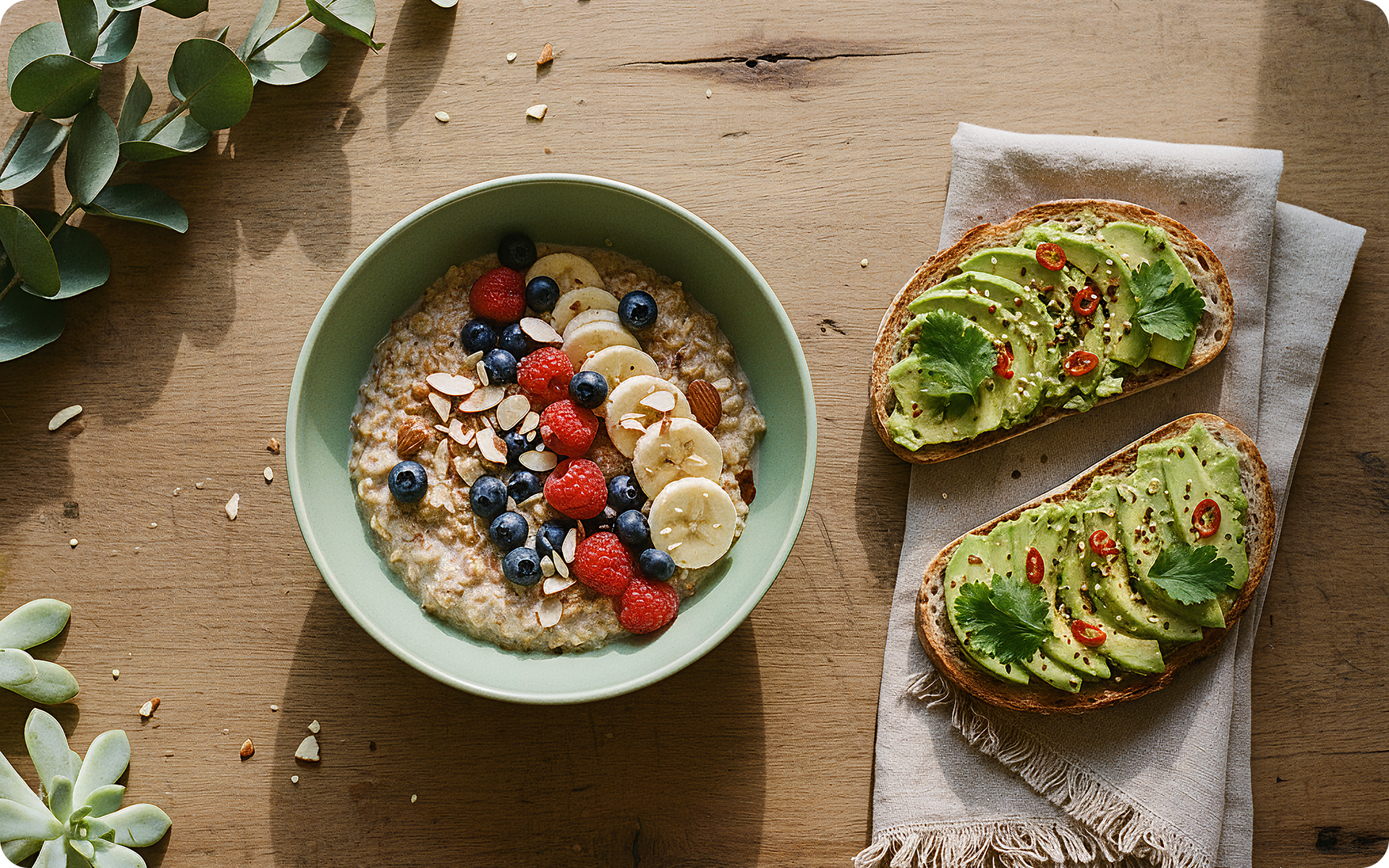TDEE Calculator
You need energy for every single activity that you engage in every day. It does not necessarily have to be as laborious as carrying a large package up the stairs and into your own home. The moment you wake up each morning to a new dawn, you have already started making use of some amount of your energy. Even while you are sleeping and assembling in a resting position, your body is still making use of energy because all along you have been breathing (7). It is for this reason that an accurate TDEE calculator is needed. The only type of human who does not make use of energy is a dead man who doesn’t breathe.
Get your personalized
meal plan!
Anyone who is looking forward to gaining more control over their weight cannot do so without using the calculator. It is because the calculator helps determine when a person is consuming too many calories and burning less of it, which will lead to more weight gain and eventually obesity if not controlled on time. During the workout sessions, the calculator helps a person know whether the energy they burn is up to the expected ratio to keep their body in shape.
An individual who wants to maintain body weight must balance the calories that they get from their food and beverages consumption with what they use daily. Although a knowledge of the total calories that are needed daily is a good guide, it is essential to get calories from foods with enough nutrients and macronutrients according to the acceptable macronutrient distribution ranges (AMDRs).
Read More: Calories In Calories Out: When Weight Loss Turns Into A Balancing Act
What Is TDEE?
TDEE stands for Total Daily Energy Expenditure. It is an evaluation of the total calories that a person uses daily through physical exercises and other activities that they engage in every day. The human body needs the energy to carry out all its activities, irrespective of how insignificant it may appear to the human sense (1). Besides physical exercises, the body also burns calories even at rest when producing heat, and even while digesting foods consumed. This means that there is virtually no time that the body does not need energy. When all the calories used are summed up, it helps determine the total daily energy expenditure (TDEE).
Interestingly, a person’s TDEE may vary from day to day, depending on the type of activities they engage in. The amount and intensity of activities carried out by an individual will most likely determine their physique, including their weight (5). Whether a person is described as overweight, obese, underweight, and normal may depend on several factors, including how active they are and how much energy they expend in performing these activities. When people complain about weight gain, part of the areas that nutritionists often encourage them to pay attention to are the type of food they consume and the activities that they involve in.
What Is My TDEE Calculator?
When discussing possible answers to the question, “What is my TDEE calculator?” there is a vital need to understand how energy is manufactured by the body to carry out the various activities that it performs. When food is consumed, it can be said that a person is fueling their body for a road trip. The food that they consume contains energy in the form of calories. It is these calories that are burnt by the body during daily activities for proper functioning.
Sometimes, the TDEE calorie calculator may help in finding out underlying reasons why a person is getting overweight by comparing the energy consumed to the energy expended (4).
BetterMe app will kick you out of the mental funk, shake off your extra weight, rid you off you energy-zapping habits, and help you sculpt the body of your dreams. Intrigued? Hurry up and change your life for the better!
TDEE And Weight Loss
As discussed earlier, a person’s weight is determined by numerous factors, including their total daily energy expended. To gain weight, a person needs to ensure that their body is supplied with more fuel than it can use daily (5). The direct opposite is then the case for someone who is attempting to do away with some amount of weight in their body. This category of people may find it beneficial to consume less food than their body needs to fuel its daily activities, or they simply increase the intensity of activities that they are involved in every day. This may be accomplished by engaging in routine workouts that help in the natural burning of more calories (2).
It is recommended that anyone aiming to lose some weight must try as much as possible to create a calorie deficit of about 3,500-7,000 calories per week (3). To explain this in actual numbers: assuming a person’s daily requirement is 2,500 calories, they will have a total calorie requirement of about 17,500 calories in a week. If such people find out that they are getting more flesh and weight than they are comfortable with, they may have to subtract between 3,500 and 7,000 calories from the 17,500 weekly calorie requirement (2). This will leave such people with a total weekly calorie of about 10500 to 14000 calories (1500 – 2000 calories per day).
To make this possible, there are two options that a person may consider: the individuals may make it a point of duty to perform exercises that will help them in burning, at least, 3,500 calories every week, or simply take the route of merely eating below your total weekly calorie requirement (5).
What Is A TDEE Calculator?
It is essential to know your way around how to use a TDEE calculator before seeking to know how accurate a TDEE calculator is. The primary function of the calculator is to help determine how much calories are burned daily. It also displays the body mass index (BMI), basal metabolic rate (BMR), macronutrients, and other essential data about a person.
The body consumes energy in various ways. It is consistently using up energy as breathing takes place and other activities that may not necessarily be physical. This is called the basal metabolic rate (BMR) (7). Knowing how much calories or energy is burned every day is crucial because it will go a long way in helping a person maintain a balanced and stable weight.
When calculating the Total Daily Energy Expenditures, three factors are given top priority, and they include the following (8):
1. Basal Metabolic Rate (BMR):
Basal Metabolic Rate refers to the rate at which energy is being used when the body is resting. It is usually dependent on several factors, including age, weight, and height. The TDEE calculator results for women will be different from that of men due to gender reasons.
2. Physical Activity And Their Intensity:
This refers to the things that an individual physically engages in during the day. It may be in the form of exercises or daily tasks at work. It is the combination of the energy used at work and during workout routines.
3. The Thermic Effect Of Food:
Someone may be shocked to hear this, but eating is actually a form of exercise and an activity that helps the body burn calories and lose weight. The energy needed for munching and digesting food varies with the type of food consumed. Some kinds of food will require more energy expenditure than others.
All other contributing factors to energy expenditure are embedded in these three major ones whose energy expenditure rate is evaluated at 20% for physical activities, 10% for thermic effect of food, and 70% for basal metabolic rate (6, 8). This indicates that even while a person is resting intending to save energy, they may actually be losing energy than saving some.
Most types of formulas used in calculating the total daily energy expenditure will consider using a combination of a person’s fitness and nutrition. Simply put, their daily activity levels and the food they consume every day will be considered. Other factors, including a person’s weight, height, workout routine, and gender, are also put into consideration.
Whether you’re looking to simply pep up your fitness routine, jazz up your diet with mouth-watering low-calorie recipes or want to get your act together and significantly drop that number on your scale – BetterMe app has got you covered! Improve your body and revamp your life with us!
Total Daily Energy Expenditure Variations
Among athletes who perform the same type of endurance activities, the total daily energy expenditure still varies. For most athletes, they burn energy depending on how serious the event is. A research conducted among athletes shows that they tend to use up more energy at the competition stage than when they are merely preparing for their competition (9).
In this case, some athletes may burn lower calories, usually less than 70%, while resting. Most athletes burn or use up more energy while engaging in physical activities. It is essential to evaluate the total daily energy requirement as it helps a person take steps towards ensuring that the weight of their body and fat content are neither too much nor too little to upset the functioning of the human body.
The total energy expended by a person will vary as a result of the earlier-listed factors. This is because there are no two persons who perform the same type of activities every day. This will, therefore, have an effect on their calorie intake since the person performing an intense daily activity may be burning more calories than another person whose activities are less strenuous.
How Much Is Enough?
As much as TDEE is the output aspect of energy, it is also essential to know its input. This is usually called energy input. Knowing this will allow an individual to reach and sustain a proportional functioning of the body. The rate at which people consume food is not necessarily a function of their stomach sizes. The factors that influence how much food they will take varies with physiology, psychology, and genetics. People eat, most of the time, when they are hungry and not because they know that they have to feed. The brain, specifically the hypothalamus, is responsible for sending signals to determine whether a person is hungry or filled at any given point in time (1).
The stomach responds to hunger and satiety differently. A hungry person may hear the stomach growl while a person who is filled feels nothing but a kind of satisfaction and nutritional fulfillment (1). Other factors that influence how much energy someone consumes in the form of food include genetics, nutrients, behavioral or psychological influences, and the number of fat tissues. When a person is conversant with their total food consumption, it will help them understand how much of TDEE is required to maintain a healthy and fit lifestyle.
Conclusion
In conclusion, the TDEE calorie calculator is an essential tool used in regular weight loss and gain programs. It helps understand the effects and consequences of the food eaten and activity level on overall weight and performance during daily activities. Knowing this information will help individuals understand whether to eat more or reduce what they take in and the types of exercises they should engage in.
DISCLAIMER:
This article is intended for general informational purposes only and does not address individual circumstances. It is not a substitute for professional advice or help and should not be relied on to make decisions of any kind. Any action you take upon the information presented in this article is strictly at your own risk and responsibility!
SOURCES:
- 6.5: Balancing Energy Input with Energy Output (2019, med.libretexts.org)
- 10 Ways to Lose 2 Pounds a Week (2019, verywellfit.com)
- Calorie Deficit for Losing weight (2020, verywellfit.com)
- Energy intake and expenditure (n.d., nutrition.org.uk)
- How to Boost Your Energy Expenditure (2019, verywellfit.com)
- Learn How Many Calories You Burn Every Day (n.d., tdeecalculator.net)
- Sleep Hormones (2020, sciencedirect.com)
- TDEE Calculator (n.d., calculator.net)
- Total Energy Expenditure, Energy Intake, and Body Composition in Endurance Athletes Across the Training Season: A Systematic Review (n.d., ncbi.nlm.nih.gov)















